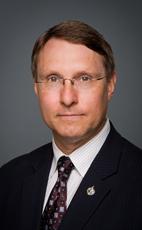Mr. Speaker, it is a pleasure to rise in the House today in support of my hon. colleague's motion. This motion, as I am sure members are aware, asks the government to develop a mechanism that would give airports not currently eligible to receive passenger and baggage screening the ability to purchase screening services from the Canadian Air Transport Security Authority, or CATSA, as it is more commonly known.
In my remarks today, I would like to highlight how our government has long supported the security of our air transport system, as well as the economic benefits that this system brings to us. I am encouraged by the fact that my hon. colleague, the member for Sherbrooke, who is a very impressive young man, has put forward a motion that highlights just one of the many initiatives our government is currently working on to promote jobs and growth while protecting Canadians.
As members of the House know, our government has long advocated policies that promote jobs, growth, and long-term prosperity. This pursuit of national prosperity, however, rests on the foundation of our national security. Indeed, as reflected in Canada's National Security Policy:
There can be no greater role, no more important obligation for a government, than the protection and safety of its citizens.
With this in mind, I want to spend a few moments highlighting some of the most salient features of our current approach to aviation security before turning my attention to the motion itself.
Aviation security—the security of aircraft, airports, and all elements of the aviation sector—is a key component of Canada's national security framework.
Canada, as many members know, was a world leader in aviation security long before the events of September 11, 2001. Following the tragic bombing of Air India Flight 182 in June 1985, Canada's civil aviation program was rapidly transformed to include more rigorous measures for screening passengers and their belongings.
The threat to aviation has not diminished in the decades since the Air India tragedy, nor have our government's efforts to mitigate it. The creation of a national screening authority, CATSA, in 2002; the introduction of in-flight security officers; the reinforcement of cockpit doors; and, in 2007, the world's first dual biometric iris and fingerprint airport identity system for workers accessing restricted areas are all examples of improvements made to Canada's aviation security system. Other examples include 100% screening of checked baggage, the implementation of the passenger protect program, and, more recently, the rollout of a national air cargo screening program.
My aim in sharing these security achievements with the House today is to stress that the security of air travel and trade is the principal focus of Canada's aviation security system. At the same time, it is very important to consider that the purpose of security is to protect, not to hinder, air transport. Aviation security measures must not harden the system to a point where they severely undermine the efficiency and competitiveness of the sector that they are trying to protect.
As I noted in the beginning of my remarks, security is a foundation upon which prosperity is built. As such, striking the right balance between investing in security and improving efficiency will always be a key feature of any government's decision-making process. Indeed, the two must go hand in hand.
Our government recognizes the important role that aviation plays in a country the size of ours. Indeed, airports, air carriers, and associated businesses are important parts of a supply chain necessary to meet the needs of the Canadian shippers and travellers who are contributing to economic growth and job creation across this country. Moreover, the Conference Board of Canada estimates that in 2012, Canadian airports accounted for $4.3 billion in real gross domestic product, but had a total economic footprint of $12 billion, generated almost 600 direct jobs, and contributed over $3 billion in federal and regional taxes.
With our security fundamentals well in place, our government is also looking closely at innovative ways to make Canada's aviation security system more cost-effective and convenient for passengers as well as for the industry that directly serves them. Presently, for example, small airports not designated for mandatory screening in the aftermath of 9/11 say that they face difficulty in attracting commercial flights. Many have indicated that the lack of security screening has become a barrier for further economic development in their communities.
In response, the Minister of Transport has been exploring ways to enable these smaller airports, like the one in my hon. colleague's riding of Sherbrooke, to obtain screening services and thereby connect to the wider aviation network. That is why our government supports the motion before us today: it reflects the work we have already undertaken.
As we continue to work toward finding the most appropriate solution to this issue, we need to ensure that the overall security of Canada's civil air system is preserved. That is why we have proposed an amendment to the motion so that screening would be delivered in the same nationally consistent manner under the authority of CATSA. Standards are very important.
In addition to a standardized security approach, the government also supports some form of user pay approach. A cost recovery approach would ensure that revenue streaming from mandated screening would be insulated from the cost of a screening service that would be primarily for the benefit of the local economy.
In short, any mechanisms developed to give smaller airports access to the broader national airport system for economic development purposes will need to ensure that national security standards continue to be met.

